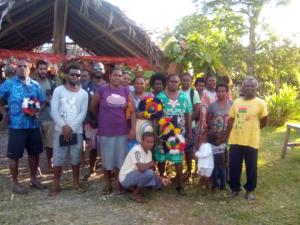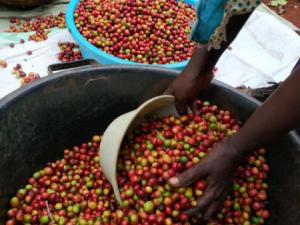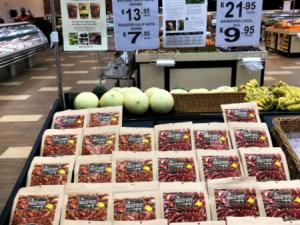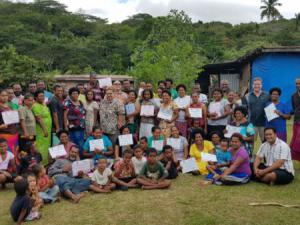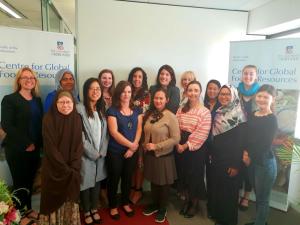Celebrating women in agriculture and resources
Blog prepared with contributions from Prof. Wendy Umberger, Prof. Sarah Wheeler, Dr. Jesmin Rupa, Dr. Alexandra Peralta , Dr. Rio Maligalig and Nikki Dumbrell
Today is International Women’s Day.
On this day we take a moment to reflect on the integral role women across the world play in agriculture not only as leading innovators but also as hard working farmers, operating family farms and contributing to their family and community’s development, well-being, nutrition and education.
At the Centre for Global Food and Resources (GFAR), we have been proud partners in multiple projects that demonstrate a strong commitment to women empowerment and overall sustainability. Here are a few examples:
In North Western Vietnam, rapidly transforming markets, competition from peri-urban and regional producers, poor infrastructure and logistics and issues with environmental sustainability and climate change are some of the challenges faced by the vegetable industry. The farms in this region are small land holdings, predominantly run and managed by women. In a project funded by Australian Centre for International Agricultural Research (ACIAR) and led by Prof. Wendy Umberger, we have assembled an interdisciplinary team to help build a) female farmer capacity and b) eliminate market barriers and help them get access to higher value urban markets for their produce. The project has twice been featured in Australian media on the occasion of International Women’s day in 2016 and 2018. This project was designed to continue to address the productivity of women’s labour with the purpose of increasing incomes and other livelihood indicators (e.g. nutrition outcomes) of rural households. Recent GFAR PhD graduate Dr. Jesmin Rupa who worked on the project, particularly Vietnam urban food consumption and expenditure study found in her PhD analysis that household diet quality (consumption frequencies of food rich in vitamin A, heme iron and protein) in urban Vietnam improves if female household heads have completed more years of education. The video below highlights some key impacts and outcomes from the project.
Although smallholder farmers are responsible for most agricultural production in sub-Saharan Africa, the majority of them remain poor and marginalised. A decade of economic growth throughout the East and Southern Africa has reshaped food value chains. But, the opportunities for many smallholders, especially women, to benefit from these new, market-oriented value chains remain elusive. GFAR is part of a project that is developing value chain innovation platforms to improve food security in Mount Elgon region in Uganda, funded by Australian Centre for International Agricultural Research (ACIAR). The project is particularly empowering and transforming smallholder coffee growers. This is occurring through women participating in activities such as training and capacity building activities within innovation platforms; running picker contracting experiments; conducting economic experiments to evaluate trust between value chain actors; and helping farmers get access to high end markets.
Cocoa is one of the most important agricultural exports for Vanuatu, it is the third most important source of cash income, provides a source of livelihood for 8,500 households in the country, with a total of 25% of Vanuatu households involved in cocoa production. With 75% of rural population, and 62.4% of these population classified as poor, interventions to boost the competitiveness of the country’s cocoa farmers are likely to improve living conditions for this population. To achieve this goal, ACIAR interventions have focused on the promotion of recommended production and post-harvest practices to improve yields and quality of cocoa produced in the island, together with facilitating access to the high price/high quality cocoa market in Australia. Contrary to old beliefs, women play a key role in cocoa production and post-harvest activities. In order to design inclusive extension strategies and boost adoption rates for recommended practices, Dr. Alexandra Peralta is leading a project that focuses on the evaluation of ACIAR cocoa interventions focusing on the effects of extension strategies in men and women’s knowledge and adoption of recommended practices, and the role of men and women’s information networks in the diffusion of information and incentives to adopt. Results from the research conducted in this project will be presented at the Seeds of Change Conference in Canberra, April 2-4 2019.
‘Canarium Indicum’ is an agroforestry tree in Papua New Guinea that produces edible nuts and has been the focus of efforts by donor agencies and The National Agricultural Research Institute (NARI) to develop as a commercial crop. The first commercial products of the Canarium Indicum tree traditionally known as Galip in PNG was launched last year. This is the result of a project funded by Australian Centre for International Agricultural Research (ACIAR) project of which GFAR has been an integral part. The development of the Galip Nut has involved countless efforts of multiple stakeholders with a collective vision of empowering local communities, generating employment and empowering women to participate in modern agricultural market chains in PNG. Women conduct the majority of the Canarium tree growing and trading activities, including nut collection, cracking, drying and selling. The project centred at the NARI pilot plant in Kerevat East New Britain (ENB) has contributed to the development of value added technologies that will enable efficient and safe processing of nuts with resulting increase in productivity.
Despite the challenges faced by the agriculture sector in the Pacific nations, it has the potential to develop value chains in the agriculture, forestry and fisheries sectors that are more efficient, more inclusive, and which take advantage of new opportunities for primary production, value-adding, and marketing. Pacific Agribusiness Research for Development Initiative Phase 2 – PARDI 2 is another project funded by ACIAR that involves activities like training programs for women covering the important topics of food safety, food value adding and value chain business skills for selling into new markets.
At GFAR we are proud of our own female academics and researchers who are exceptional leaders in their own fields and are an inspiration to other young researchers. In the field of agriculture and applied economics where globally women are underrepresented, we are proud of the fact that more than 50% of our researchers and PhD students are women actively involved in contributing new knowledge to the field and making significant contributions in research and academia. Indeed, two of the Directors of GFAR are women, which makes our Centre quite unique worldwide. One of our recently graduated PhD students Dr. Rio Maligalig shares her views on the role of women in agriculture research:
“The United Nations Entity for Gender Equality and the Empowerment of Women has emphasised “it is vital that women’s ideas and experiences equally influence the design and implementation of the innovations that shape our future societies”. I think this should also be front and centre in the way we carry out our agricultural research and development programs. We should let women in agriculture participate and have a say in how farming technologies and practices are designed and implemented as they too can provide valuable inputs. Their inputs can then be included to form a more gender-responsive set of practices that can possibly provide them with more options and increase their influence in intra-household decision making”.

